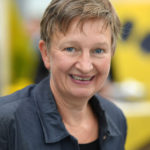
Ise Bosch.
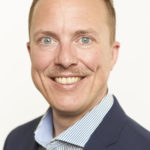
Justus Eisfeld.
As a philanthropist, Ise Bosch goes her own way. A scion of a well-known German philanthropic family, she nevertheless chooses the issues she funds and the way she funds them. The recent award of the German foundation prize suggests that others are taking heed of what she is doing. With her close colleague Justus Eisfeld, with whom she recently co-wrote Transformative Philanthropy: Giving with trust, she talks to Alliance editor Charles Keidan about her approach to giving, about power and privilege, and about non-binary philanthropy, the issue in which she has invested so much of her energy and resources.
In your acceptance speech to the German Association of Foundations, when you won its annual Stifterpreis, you said you would like to use the power and privilege you have to help create more egalitarian societies. Is that the vision of your philanthropic work in one sentence?
IB: I think egalitarian societies are a precondition for human growth, which ultimately is about truth-seeking. What are we truly about? We live at a time with dramatically worsening conditions. What we used to think was a great thing – liberal democracy in its different forms – is showing deep cracks and even the concept of egalitarianism is not that popular anymore.
It makes sense to choose communities and issues that you are personally interested in. I have taken the one that is closest to my heart, which is sexual and gender diversity.
How do you reconcile the privilege which you have with the wish to challenge the structures that created that privilege in the first place?
IB: The book and working with Justus and others has enabled me to think this through. Yes, money provides power. There are political answers to this which are to share. It’s very simple.
How do you reconcile it on a philanthropic level?
IB: You don’t. It’s impossible. You leave it unreconciled.
Justus, what were the ideas behind the book and what do you hope to achieve through it?
JE: One of the things that we hope to address with this book is those difficult questions that philanthropists and philanthropists-to-be run up against, like exactly that question of privilege. How do you figure out where to give? How do you give in a way that’s perceived as an act of solidarity as opposed to an act of control? From my perspective, the way that Ise has been doing her philanthropy is an example of best practice. We wanted to show people how it works and inspire them to do similar things.
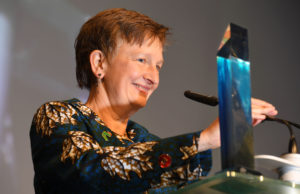
Could you give an example of that best practice?
JE: From the interviews with all kinds of people connected with Dreilinden – grantees, fellow philanthropists, people from her investment council – one thing that clearly came out was that trust is central to Ise’s giving. Trust entails giving people the freedom to do whatever they feel is most important with the money. That’s reflected in grant agreements which are one or two pages long maximum, and with most of those grants being unrestricted. Ise is also very up-front about what her intentions are, why she’s decided to give to a particular group or project, and how long she plans to do so.
Ise, how do you decide which people and organizations to support?
IB: It makes sense to choose communities and issues that you are personally interested in. I have taken the one that is closest to my heart, which is sexual and gender diversity. It’s a vastly underfunded field, especially in intersex and transgender issues, and also in the rural areas of the world. So it’s a personal choice – a political analysis on the basis of where you are as a person.
But even within the field of sexual and gender diversity, you have to make choices between a number of competing ideas or organizations. How do you do that?
IB: The more you know, and the more trust you have in the field, the better you’ll do it. It’s a process of getting yourself immersed and you will encounter the needs. There are few places where you couldn’t find things that need good, well thought out funding.
JE: You can see the choice of who to give to as a luxury. Working in a field that is underfunded and under-resourced in other ways creates a choice for you, because whatever you end up doing, you will likely make a difference. This means you can actually focus on what is best suited to you and can do your work in a way that is joyful to you. Looking at it that way has helped free me from the ‘oh my god, there’s so much to do’ approach.
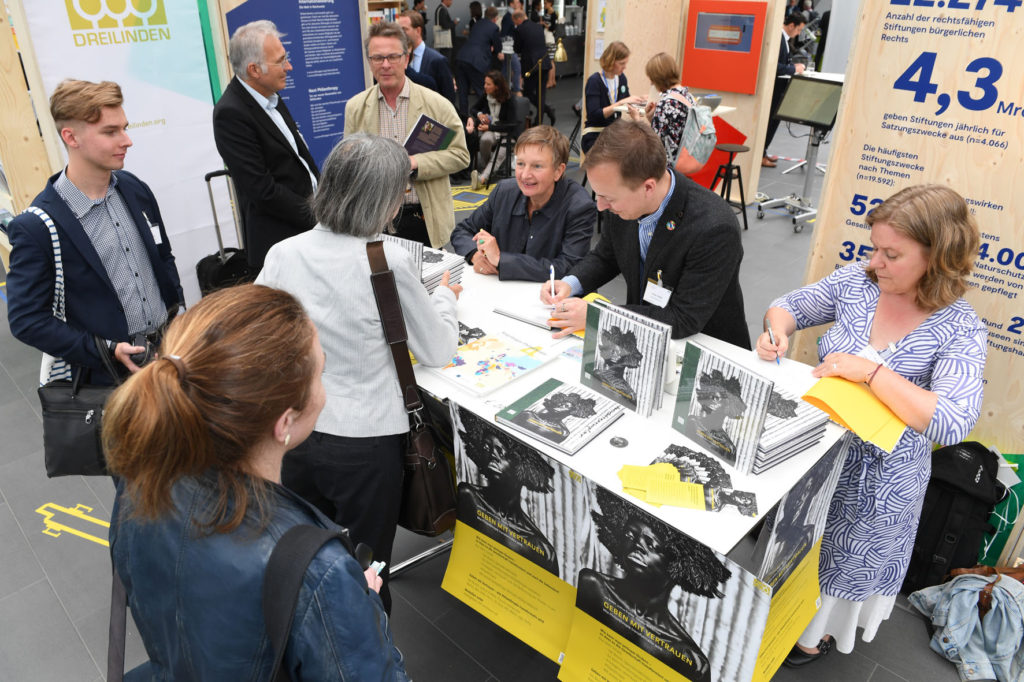
Bosch and Eisfeld at Deutscher StiftungsTag 2018.
Ise, you’re noted for deploying a variety of tools and approaches in your philanthropy. You haven’t set up your own foundation, but you have established Dreilinden as an LLC and filia.die frauenstiftung, a women’s community foundation. You’ve been a founding donor of Astraea, which is a lesbian fund, and you have a distinct approach to impact investing and social investment. What’s behind this?
IB: Again, it’s very practical political analysis: here are the goals, and here are the opportunities, and if there’s good infrastructure that needs financial strengthening, then I back that, rather than inventing something new. If we don’t have a community of givers, I invest in the community foundation. Essentially this is setting up good infrastructure for communal forms of giving.
And how did you decide how much of your wealth to give?
IB: By making a will. That always focuses you on the long term. You realize that what you’re doing is informed by values which are even more important than money, which might give direction to your family or inheritors. Once you’ve done that you can easily figure out how much you have left over during your lifetime, and it’s much more fun to give while you’re alive. I hope to go out of this world with most of the money in very good hands, and to have increased the power to do good for the long term. With this kind of goal in mind, it becomes very simple to decide how to spend my time, and how much to give.
I want to go back to the question of trust and control. We have successfully professionalized philanthropy since the 80s and 90s. That professionalization is a positive development but it seems to me we have gone overboard in overemphasizing impact measurement. We’ve neglected the force of trust.
Sexuality is an extremely deep-seated issue. We don’t understand very much about it and so there is much fear around it. We have to win people over one by one. The intended result is a more differentiated picture of what sexuality and gender are.
We now have some quantitative data from ten years of working on the basis of trust as opposed to control. We’ve seen how it adds value to the money we’re giving. Lots of funders give more than money by providing capacity building or supporting networks. If you truly do it in the spirit of best supporting the work, it adds tremendously and it runs counter to the idea that ‘I need proof that your work is worth it’. Of course I want impact, but that impact grows by being less controlling, and being very transparent about how long they can count on me, what I’ll do if I exit and so on.
JE: For grantees, it makes a huge difference to know that the funder has every intention of giving grants for the next ten years, even if the current grant agreement is only valid for a couple of years. But that longer-term perspective reduces a lot of stress and anxiety on the part of grantees and gives them head space to think long-term.
How does that question of trust relate to the field in which you have invested so much of yourself, namely questions of gender, LGBTI rights and challenging the strict binary divisions between the sexes?
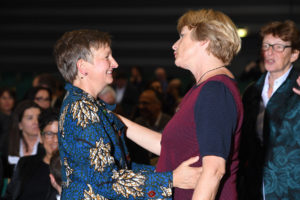
Bosch with Katrin Wolf.
IB: Sexuality is an extremely deep-seated issue. We don’t understand very much about it and so there is much fear around it. We have to win people over one by one. The intended result is a more differentiated picture of what sexuality and gender are.
JE: I’ve found that the more marginalized the community, the more impact trusting a grantee has. That’s because these are people who have not been trusted by society with anything. So somebody saying, ‘I trust what you do is right and will have impact’ gives them a huge boost and it creates a completely different way of understanding the money. I’ve talked to people who have a $5,000 unrestricted grant from Astraea and also received a $50,000 grant for HIV services provision from somewhere else, but the latter comes with so many restrictions that it feels like they are handling someone else’s money. They feel ownership of the Astraea grant. They feel they can actually do what they need to be doing.
Is your vision one of a society where people can live with gender and sexual diversity?
JE: In northern and western societies particularly, we have been taught that something is either good or bad, true or not true, wrong or right, male or female. Even as a trans person myself, I catch myself thinking in binary terms still. Opening myself to a lot less binary thinking on sexuality has given me a very different perspective on other kinds of binaries in the world.
IB: I long for the time when it’s not necessary to move out of rural areas to a big city because you’re queer. We’re getting there. Worldwide, there are beginning to be organizations in the countryside. Tolerance of gender and sexual diversity is something that I believe human society can learn and it will improve the lives of all of us, not only the lives of those who live with what is currently a stigma. Around 2.7 billion people live in countries where homosexuality is a punishable offence. But I have observed that families and communities which manage to relax about living with homosexuality live better.
In your speech in Germany, you spoke movingly about a queer friend in India, the late Betu Singh, daughter of an Indian military officer. How did that relationship come about?
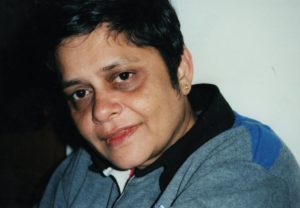
The late Betu Singh.
IB: The NGO she founded was a grantee of Astraea’s International Fund for Sexual Minorities. Wherever I travel, I ask Astraea who its grantees are in that region. Then I go and visit. It feels like meeting friends and, in some cases, it leads to real friendships and that’s what happened there. Betu did community building with the lesbians of New Delhi. Her apartment was a meeting place. Her NGO ran an advisory phoneline and in the Times of India advertised help for women who love women – that was their term, rather than lesbian. It went into jails and did interviews on the situation of lesbians there, and then worked with the city and even state government on improving that situation. There are now about 15 of these groups around India, maybe half of them were grantees of Astraea. In addition, there are now stronger regional and national organizations who run campaigns to overturn repressive legislation like Section 377.
So you now strengthen national infrastructure organizations to support LGBT equality?
IB: Exactly. And, through Astraea, local organizations.
How far is the German foundation sector engaging with these issues? When you won the Stifterpreis, you told the German Association of Foundations conference that its award showed a willingness among the German foundation community to be progressive. But you also raised some really hard questions. For example, you asked why German foundations aren’t doing more to protect minorities? Why there aren’t more of them supporting social movements like #MeToo? You mentioned that only one out of the largest 35 German foundations has a female CEO, and only four German foundations are supporting sexual and gender minorities at an international level. What do you think German foundations should be doing?
IB: German foundations have been resilient. They survived the Third Reich and Communism but the drawback is that they have a hard time renewing themselves. Now, we have a younger generation who are beginning to think differently. There is actually a network of progressive foundations, the Wandelstiften network, which is founded independently of the Association of German Foundations.
Donor education and philanthropy media such as Alliance are helpful in exposing people to different viewpoints. And I very much welcome a current move to update foundation law in Germany so it’s the meeting point for all German philanthropy including non-foundation philanthropy.
JE: The day after the speech we had a book table and we had so many people come up to us and say, ‘thank you, this is a breath of fresh air’. Just hearing the terms lesbian, gay, bisexual, transgender, intersex, feminist spoken on a national stage and feeling like it’s supported by our national council of foundations was a huge shift for many people.
At the end of your speech, Ise, you invited anyone in the audience who was committed to increasing gender diversity to join you on stage. Did people actually come up?
IB: Yes, something like 30 or 40 came on stage. And the speech got a minute-long standing ovation. And Justus is right about the remarks the next day, which are still coming in. Not only women, but so many non-white people who were there came up to me, saying they felt seen because I brought up diversity issues. People working in German philanthropy have an image of themselves pushing for progress as if we were at the foot of a large hill and we go up a little bit, then we slide down again. I want to transform that so that we say, ‘hey, we’re actually pretty high up the hill already, and there are many of us in it together’. As Felix Oldenburg, the CEO of the German Association of Foundations, said, ‘we cannot go back on this, and probably the solutions to the problems are already in the room’.
Just hearing the terms lesbian, gay, bisexual, transgender, intersex, feminist spoken on a national stage and feeling like it’s supported by our national council of foundations was a huge shift for many people.
So are you confident that by next year’s conference, there will be more than one female CEO among the largest 35 German foundations?
IB: I guess the test will be who gets the prize next year, because we have other diversity issues too. There’s definitely an issue of ethnic background, which is not very well represented. The solutions are there in ourselves and in our communities. It’s just that the distribution of power does not represent the constituencies. But it won’t take that much to flip to more egalitarian and more collegial relationships among experts, the true expertise which derives from experience.
What do you think your grandfather would have thought of what you’re doing? Do you think the foundation he set up could lead the way among German foundations to an even more progressive direction?
IB: Robert Bosch was a human rights champion, he talked about human dignity before all of the documents on the subject were written. So I definitely take my lead from him. I see great work at the foundation that carries his name. There’s an initiative called ‘Togetherness and Diversity’, so I think we will see more in that direction and yes, they will be an excellent champion for this among larger foundations.
JE: I’d also like to see diversity reflected in foundation hiring practices which is such a crucial part of diversifying foundations and foundation giving. I think many people underestimate how different the expertise that comes from somebody who’s been a part of a community is from the expertise from somebody who’s been a professional philanthropy worker and has to learn about the community. There’s an immense difference in the quality of grants they can make and the kinds of connections and trust that they have from those communities. That’s one way that foundations could make a huge difference.

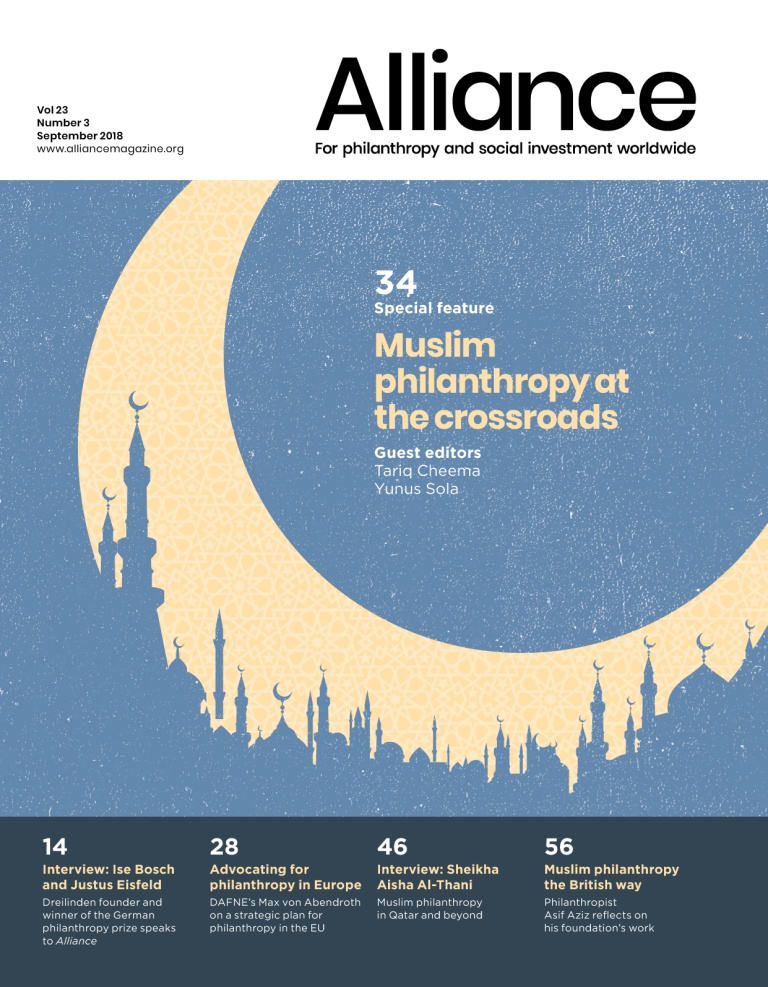




Comments (0)